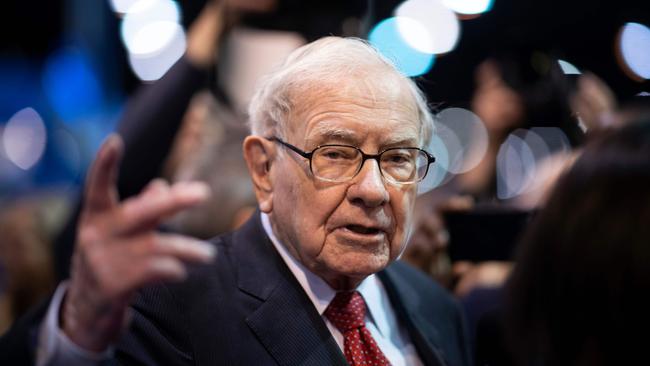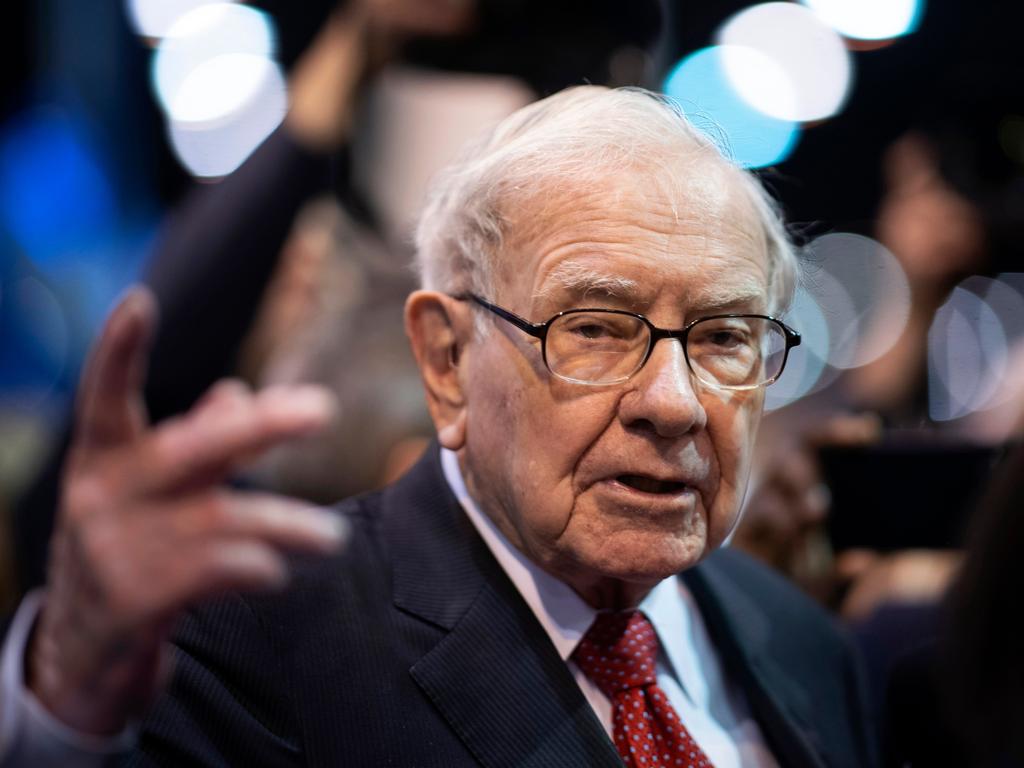Warren Buffett sold half of his Apple holdings so what does that mean for the market?
When the world’s greatest investor sells half of his stake in one of the world’s top tech stocks it’s a major event, but the reasons tell us more about Buffett than it does Apple.

Whenever I write about billionaire hedge fund managers predicting a market crash and then dismiss them as akin to Henny Penny saying the sky falling in, some smart reader will ask: “what about Berkshire’s record cash holding?”
They’re not alone. Right now, with Berkshire’s cash pile soaring by a record $US88bn to an all-time high of $US277bn at the end of the second quarter, there are plenty of reports saying Berkshire’s Warren Buffett is predicting an imminent crash – or noting that it must mean “value” is absent.
So, does Berkshire’s cash pile have any predictive value?
Sometimes it’s correct to conclude a rising cash balance at Berkshire reflects Buffett’s nervousness about the market’s heady levels but, thanks to the cash-generating nature of the businesses owned by Berkshire as well as the limited opportunity to make meaningful acquisitions with such large amounts of cash being produced, the cash balance is frequently reaching a “record”.
Indeed, Berkshire’s cash balance can reach new record levels quarterly. Clearly, Buffett isn’t predicting a market crash each quarter.
Nonetheless, while cash at Berkshire has been trending up for decades, it has recently accelerated, leading many more commentators to conclude Buffett and his management are forecasting a correction.
The reality is that the most recent jump in cash is the result of a significant sale of Apple shares. Berkshire started to reduce its holdings in Apple in late December 2023.
According to filings published on August 3, 2024, Buffett sold around 390 million Apple shares, which equated to roughly half Berkshire’s holding in the tech giant.
Thinking generally about Buffett’s motivation for selling Apple, we might first note that Apple was the largest holding in Berkshire’s portfolio by some distance. As at the end of the first quarter of ’24 it accounted for 40.8 per cent of the portfolio, and that was after the sale of a net $US17.3bn.
It is also worth noting the Apple position was extremely profitable. While some will say that holding half the position indicates ongoing faith in the outlook for the company, selling half is also a trading management strategy. Selling the entire holding would signal to brokers working for Berkshire that something was wrong with Apple, possibly resulting in an inferior selling price.
More specifically, however, Berkshire’s sale of Apple shares might have been in anticipation of an unfavourable outcome in a court case brought by the United States against Google.
In a ruling by Judge Amit Mehta in the case United States of America versus Google LLC the court, in addition to frowning on Google’s reported destruction of evidence, reached the following conclusion: “Google is a monopolist, and it has acted as one to maintain its monopoly. It has violated Section 2 of the Sherman Act.”
So, Google’s ubiquitous search engine has been illegally exploiting its dominance to stifle innovation and kill competition. How does that relate to Apple you ask?
Apple was receiving tens of billions of dollars from Google to prioritise Google’s search engine on Apple’s operating systems. The deal was so lucrative for Apple that it was uneconomic for Apple to launch its own search engine – something it had planned to do earlier but shelved, reducing competition in search. The court noted the loss of tens of billions of dollars in guaranteed revenue from Google – which arrived at little to no cost to Apple – disincentivised Apple from launching its own search engine when it otherwise had built the capacity to do so.
Subject to the outcome of a lengthy appeals process, Apple will lose those tens of billions of dollars in revenue, received with a gross margin of near enough to 100 per cent.
Therefore, it is possible that Berkshire’s sale of Apple, which recently pushed its cash balance to yet another record, has nothing to do with predicting corrections.
We can also chart Berkshire Hathaway’s cash balance over time and plot those cash balances against the S&P 500 to examine how helpful Berkshire’s record cash balances are at predicting the market’s next move.
We know that between 2009 and 2022 Berkshire’s cash balance more than trebled from less than $US50bn, frequently printing new record cash balances. During that 13-year window, the S&P 500 quintupled. Clearly, record cash didn’t correlate with subsequent market crashes.
A closer examination of the relationship does reveal Buffett deploying lots of cash during, and after, market crashes, but that examination doesn’t show strong evidence for any belief in the idea that record cash balances means a crash is imminent.
If a crash does transpire, you can expect some of Berkshire’s cash to be deployed by Buffett, but you cannot say with certainty that a record cash balance is an ominous sign of a market correction.
If a correction does transpire, the event is merely coincidental to Berkshire’s cash, although it will be something Buffett will take advantage of, as you should.
Roger Montgomery is founder and chief investment officer at Montgomery Investment Management






To join the conversation, please log in. Don't have an account? Register
Join the conversation, you are commenting as Logout